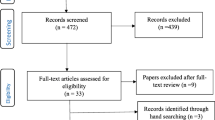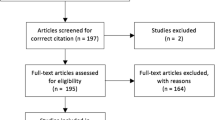Abstract
This review synthesises theoretical approaches and methodological considerations in mental health service quality assessment from consumers-perspective. We searched published articles from databases: EMBASE, MEDLINE, CIHNAL, Scopus, Web of Science, and PsycINFO. Of the 30 included papers, 16 contained instruments used to mental health quality assessment and 14 focused on theoretical constructs. The review finds that mental health quality assessment is explained and measured using constructs that focus on structure, process and outcome. The methodological issues that need critical consideration are the context and cultural norms of services, outcome perspectives, evaluator, sources of information as well as the selection of consumers and instruments. The review recommends that researchers and clinicians should consider the theoretical constructs and methodological issues in mental health quality assessment.


Similar content being viewed by others
References
Ahlfors, U. G., Lewander, T., Lindström, E., Malt, U. F., Lublin, H., & Malm, U. (2001). Assessment of patient satisfaction with psychiatric care: Development and clinical evaluation of a brief consumer satisfaction rating scale (UKU-ConSat). Nordic Journal of Psychiatry, 55(sup44), 71–90.
Amatulli, A., Azzone, P., & Srebnik, D. (2005). Monitoring the quality of an Italian public psychiatric service: A four dimensions study of the outcome. The European Journal of Psychiatry, 19(1), 5–18. https://doi.org/10.4321/S0213-61632005000100001.
Arya, D., & Callaly, T. (2005). Using continuous quality improvement to implement a clinical governance framework in a mental health service. Australasian Psychiatry, 13(3), 241–246.
Attkisson, C. C., & Greenfield, T. K. (2004). The UCSF Client Satisfaction Scales: I. The Client Satisfaction Questionnaire-8. The use of psychological testing for treatment planning and outcomes assessment: Instruments for adults (3rd ed., Vol. 3, pp. 799–811). Mahwah: Lawrence Erlbaum Associates Publishers.
Birleson, P., Brann, P., & Smith, A. (2001). Using program theory to develop key performance indicators for child and adolescent mental health services. Australian Health Review: A Publication of the Australian Hospital Association, 24(1), 10–21.
Boyer, L., Baumstarck-Barrau, K., Cano, N., Zendjidjian, X., Belzeaux, R., Limousin, S., … Auquier, P. (2009). Assessment of psychiatric inpatient satisfaction: A systematic review of self-reported instruments. European Psychiatry, 24(8), 540–549.
Brannan, A. M., Sonnichsen, S. E., & Heflinger, C. A. (1996). Measuring satisfaction with children’s mental health services: Validity and reliability of the satisfaction scales. Evaluation and program planning, 19(2), 131–141. https://doi.org/10.1016/0149-7189%2896%2900004-3.
Braun, V., & Clarke, V. (2006). Using thematic analysis in psychology. Qualitative Research in Psychology, 3(2), 77–101.
Ching, Y.-C. (2011). Translating and adapting mental health service outcome measurements for use in Taiwan. Journal of Nursing Research, 19(3), 190–198.
Donabedian, A. (2005). Evaluating the quality of medical care. The Milbank Quarterly, 83(4), 691–729.
Duckers, M. L., & Thormar, S. B. (2015). Post-disaster psychosocial support and quality improvement: A conceptual framework for understanding and improving the quality of psychosocial support programs. Nursing & Health Sciences, 17(2), 159–165. https://doi.org/10.1111/nhs.12162.
Funk, M., Lund, C., Freeman, M., & Drew, N. (2009). Improving the quality of mental health care. International Journal for Quality in Health Care, 21(6), 415–420.
Gaebel, W. (1997). Quality assurance in psychiatry: Concept and methods. European Psychiatry, 12, 79s–87s.
Gigantesco, A., Morosini, P., & Bazzoni, A. (2003). Quality of psychiatric care: Validation of an instrument for measuring inpatient opinion. International Journal for Quality in Health Care, 15(1), 73–078.
Grabowski, D. C., Aschbrenner, K. A., Rome, V. F., & Bartels, S. J. (2010). Quality of mental health care for nursing home residents: A literature review. Medical Care Research & Review, 67(6), 627–656. https://doi.org/10.1177/1077558710362538.
Hansson, L., & Höglund, E. (1995). Patient satisfaction with psychiatric services: The development, reliability, and validity of two patient-satisfaction questionnaires for use in inpatient and outpatient setting. Nordic Journal of Psychiatry, 49(4), 257–262.
Henderson, C., Hales, H., & Ruggeri, M. (2003). Cross-cultural differences in the conceptualisation of patients’ satisfaction with psychiatric services: Content validity of the english version of the verona service satisfaction scale. Social Psychiatry and Psychiatric Epidemiology, 38(3), 142–148. https://doi.org/10.1007/s00127-003-0606-7.
Hermann, R., & Mattke, S. (2004). Selecting indicators for the quality of mental health care at the health systems level in OECD countries. OECD Health Technical Papers, No. 17, OECD Publishing, Paris, France.
Hopia, H., Latvala, E., & Liimatainen, L. (2016). Reviewing the methodology of an integrative review. Scandinavian Journal of Caring Sciences, 30(4), 662–669.
Ivarsson, B., & Malm, U. (2007). Self-reported consumer satisfaction in mental health services: Validation of a self-rating version of the UKU-consumer satisfaction rating scale. Nordic Journal of Psychiatry, 61(3), 194–200. https://doi.org/10.1080/08039480701352488.
Kelley, E., & Hurst, J. (2006). Health care quality indicators project conceptual framework paper, OECD Health working papers, No. 23.
Kilbourne, A. M., Beck, K., Spaeth-Rublee, B., Ramanuj, P., O’Brien, R. W., Tomoyasu, N., et al. (2018). Measuring and improving the quality of mental health care: A global perspective. World Psychiatry, 17(1), 30–38.
Mayring, P. (2014). Qualitative content analysis: Theoretical foundation, basic procedures and software solution. Klagenfurt.
McGrath, B. M., & Tempier, R. P. (2003). Implementing quality management in psychiatry: From theory to practice—shifting focus from process to outcome. Canadian Journal of Psychiatry, 48(7), 467–474.
McKay, R., Coombs, T., & Pirkis, J. (2012). A framework for exploring the potential of routine outcome measurement to improve mental health care. Australasian Psychiatry, 20(2), 127–133. https://doi.org/10.1177/1039856212436621.
Miglietta, E., Belessiotis-Richards, C., Ruggeri, M., & Priebe, S. (2018). Scales for assessing patient satisfaction with mental health care: A systematic review. Journal of psychiatric research, 100, 33.
Moher, D., Liberati, A., Tetzlaff, J., Altman, D. G., & Group, P. (2009). Preferred reporting items for systematic reviews and meta-analyses: The PRISMA statement. PLoS Medicine, 6(7), e1000097.
Montgomery, P., Rose, D., & Carter, L. (2009). Patient health outcomes in psychiatric mental health nursing. Journal of Psychiatric and Mental Health Nursing, 16(1), 32–45. https://doi.org/10.1111/j.1365-2850.2008.01327.x.
Pearson, A., White, H., Bath-Hextall, F., Apostolo, J., Salmond, S., & Kirkpatrick, P. (2014). Methodology for JBI mixed methods systematic reviews. The Joanna Briggs Institute Reviewers Manual, 1, 5–34.
Pellegrin, K. L., Stuart, G. W., Maree, B., Frueh, B. C., & Ballenger, J. C. (2001). A brief scale for assessing patients’ satisfaction with care in outpatient psychiatric services. Psychiatric Services, 52(6), 816–819.
Reininghaus, U., & Priebe, S. (2012). Measuring patient-reported outcomes in psychosis: Conceptual and methodological review. The British Journal of Psychiatry, 201(4), 262–267. https://doi.org/10.1192/bjp.bp.111.107615.
Ruggeri, M., Lasalvia, A., Salvi, G., Cristofalo, D., Bonetto, C., & Tansella, M. (2007). Applications and usefulness of routine measurement of patients’ satisfaction with community-based mental health care. Acta Psychiatrica Scandinavica, 116(SUPPL. 437), 53–65. https://doi.org/10.1111/j.1600-0447.2007.01093.x.
Salzer, M. S., Nixon, C. T., Schut, L. J., Karver, M. S., & Bickman, L. (1997). Validating quality indicators. Quality as the relationship between structure, process, and outcome. Evaluation Review, 21(3), 292–309.
Schene, A. H., Koeter, M., van Wijngaarden, B., Knudsen, H. C., Leese, M., Ruggeri, M., et al. (2000). Methodology of a multi-site reliability study: EPSILON study 3. The British Journal of Psychiatry, 177(Suppl39), s15–s20. https://doi.org/10.1192/bjp.177.39.s15.
Schroder, A., Larsson, B. W., & Ahlstrom, G. (2007). Quality in psychiatric care: An instrument evaluating patients’ expectations and experiences. International journal of health care quality assurance, 20(2), 141–160. https://doi.org/10.1108/09526860710731834.
Sixma, H. J., Kerssens, J. J., Campen, C. V., & Peters, L. (1998). Quality of care from the patients’ perspective: From a theoretical concept to a new measuring instrument. Health Expectations, 1(2), 82–95.
Taube, M., & Berzina-Novikova, N. (2018). Improving the quality of psychiatric care in Latvia by measuring patient experiences. Health Policy, 122, 765.
Thornicroft, G., & Slade, M. (2014). New trends in assessing the outcomes of mental health interventions. World Psychiatry, 13(2), 118–124.
van Hasselt, F. M., Krabbe, P. F. M., Postma, M. J., & Loonen, A. J. M. (2015). Evaluation of health promotion programmes in severe mental illness: Theory and practice. International Journal of Methods in Psychiatric Research, 24(1), 83–97. https://doi.org/10.1002/mpr.1456.
Watkins, K. E., Keyser, D. J., Smith, B., Mannle, T. E., Kivlahan, D. R., Paddock, S. M., … Pincus, H. A. (2010). Transforming mental healthcare in the veterans health administration: A model for measuring performance to improve access, quality, and outcomes. Journal for Healthcare Quality, 32(6), 33-42; (quiz 42–33). https://dx.doi.org/10.1111/j.1945-1474.2010.00109.x.
Whittemore, R., & Knafl, K. (2005). The integrative review: Updated methodology. Journal of Advanced Nursing, 52(5), 546–553.
World Health Organization [WHO]. (2003). The mental health context. Geneva.
Acknowledgements
The authors wish to thank the University of Newcastle Graduate Research Australia, for the Doctoral Scholarship offered to the lead author. The authors are also grateful for the support received from Debbie Booth, the Librarian for supporting the literature search.
Author information
Authors and Affiliations
Corresponding author
Ethics declarations
Conflict of interests
All authors declare that they have no conflict of interest.
Additional information
Publisher's Note
Springer Nature remains neutral with regard to jurisdictional claims in published maps and institutional affiliations.
Appendix
Rights and permissions
About this article
Cite this article
Badu, E., O’Brien, A.P. & Mitchell, R. The Conceptualization of Mental Health Service Quality Assessment: Consumer Perspective. Adm Policy Ment Health 46, 790–806 (2019). https://doi.org/10.1007/s10488-019-00955-w
Published:
Issue Date:
DOI: https://doi.org/10.1007/s10488-019-00955-w




